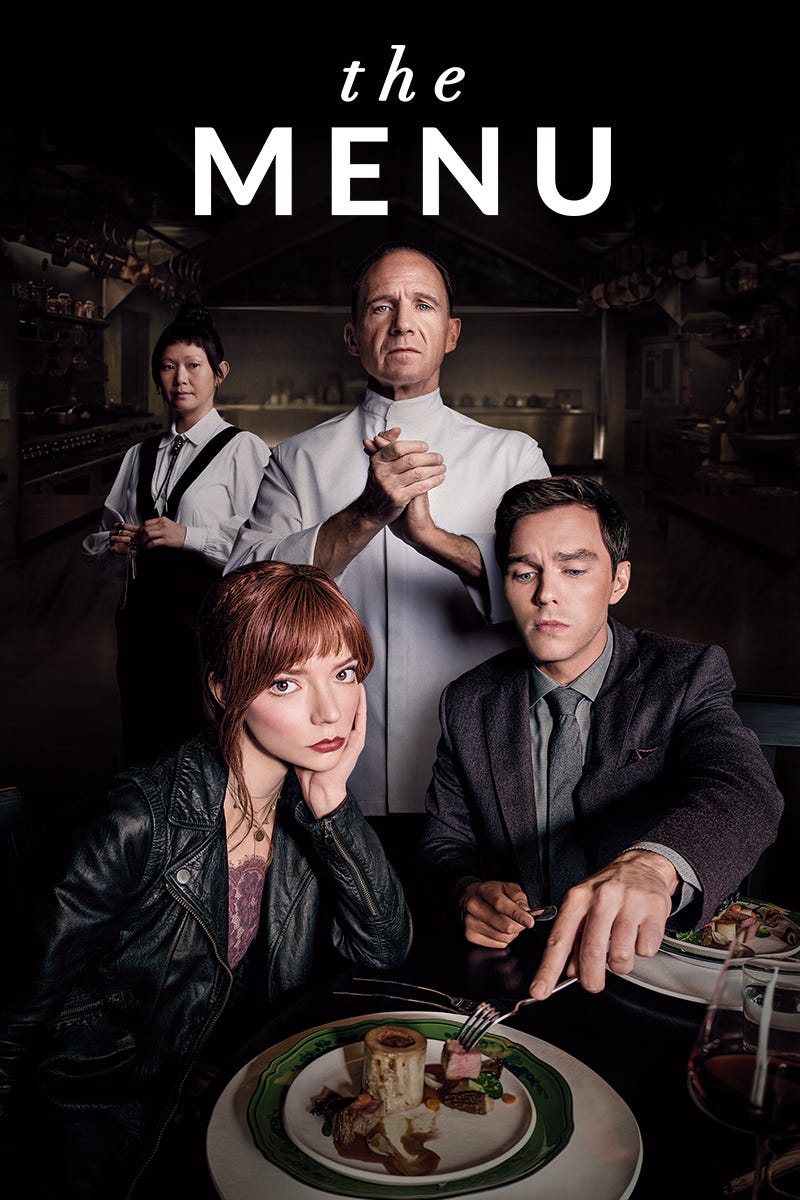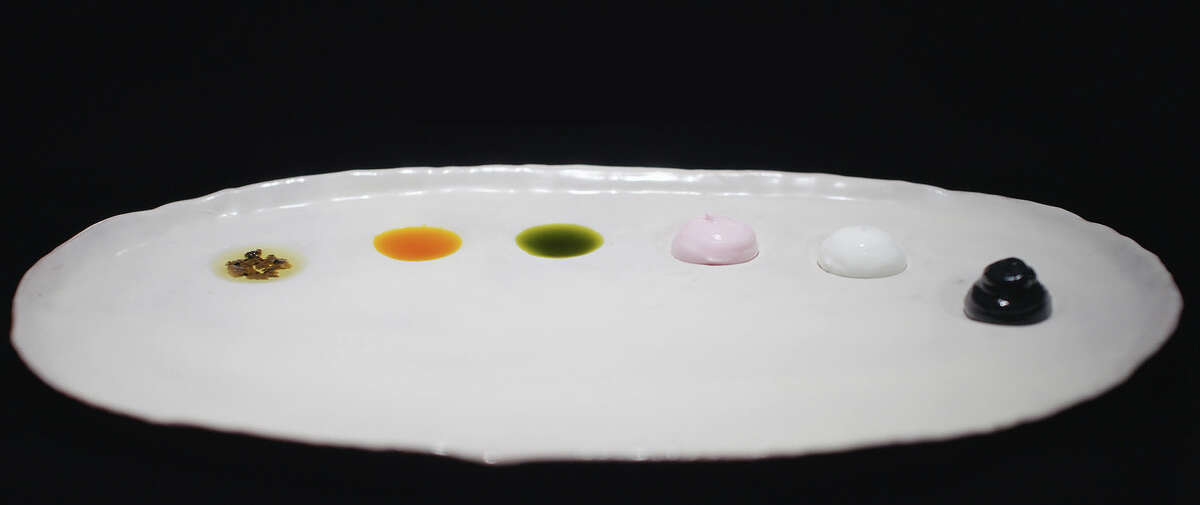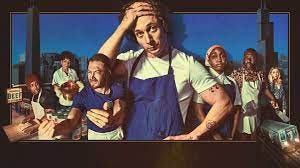The Breadless Bread Plate
What the fine dining meltdown might have to say about our collective exhaustion.
I meant for this newsletter to be fun, really I did.
But lately, every time I sit down to write, words pour forth unencumbered, as if from the garrulous mouth-hole of a speechwriter for a Cold War-era American president. Lofty words like mystery and worldview and courage. I don’t know why this happening, except that it’s the year of our lord two-thousand-twenty-three, and the royal figurehead of history’s largest empire is being threatened by a c-list actor (#teamharry, though), and my three already useless degrees in English literature are officially obsolete (hello, ChatGPT), and pretty soon we’ll all have microchips permanently installed in our nasal cavities, from which robots will leach the dregs of our individualism (aka the vestiges of “data” yet unmined by the very platforms on which I now write), that data which said robots will then commandeer and turn against us, effectively obliterating humanity alongside all other natural life forms.
So yeah, maybe it’s a good time to talk about things like courage.
But even in these trying times, we need breaks from my blathering, high-minded idealism. Let’s talk about food.
Specifically, let’s talk about what’s happening in the restaurant industry.
The only restaurant service job I’ve ever had was at TBonz Gill and Grill in Charleston, where I was a hostess in college. English majors make poor hostesses because they can’t count numbers, so I always double-sat the servers. Also I never partied after my shift—had never, in fact, tasted alcohol—and would have lit myself on fire before saying a cuss word. I was not, by the rowdy staff of TBonz Gill and Grill, beloved.
But fast forward to 15 years later, when I edited a food magazine for a few years. During that time I was invited to a lot of restaurant openings and media lunches and free food festivals, where I sampled enough gratis amuse-bouches to fill a banquet hall. I spoke fluent “foodie” and whispered about not-yet-public eating destinations to my social circle. I knew who was getting James Beard nominations and Michelin stars. And it all happened at the same time foodie-ism was taking over America. I like to think I redeemed my former restaurant uncoolness.
Anyway a few things have converged lately to renew national interest in fading foodie culture. First, the insane movie The Menu was released on HBO, which satirizes the glorification of fine dining (at the expense of those in the “back of house”). My husband and I watched this one evening a couple weeks ago. At its conclusion, I walked out of the living room, brushed my teeth in silence, and did not say another word until I woke up the next morning. I also exited the room twice during the film and announced more than once that I was going to throw up. This movie is straight bonkers.
Technically The Menu belongs to the horror genre, in the same way Get Out is horror. It reminded me of Midsommer, too—but also these three films are the sum total of every horror movie I’ve ever watched in my life, so maybe that’s why they remind me of each other.
They also have this in common: smart cultural commentary masquerading as horror, and they are less “scary” than “excruciatingly tense.” (Hence the compulsion to vomit.) If you can think of them as commentary, instead of as gratuitously shocking, they are fascinating and, for my tender sensibilities, more watchable. (The Menu also becomes hilarious.)
I digress. So, avoiding spoilers (watch it!), just know that The Menu follows the culture of fine dining to its absurd conclusion: criminally rich customers fawning over purist dishes they only pretend to understand and probably don’t actually like, chefs and servers willing to devote their lives to the cause of “transcendent” food experiences, and the illusion of ease surrounding it all. Even when my upper lip was sweaty from the tension, I had several lol moments, such as when the somber-faced chef serves the high-concept and hilariously pretentious “breadless bread plate” (IYKYK).
Other restaurant references have surfaced in recent pop culture: the phenomenal, gritty, restaurant-centered series The Bear was released back in June ‘22 and centers the brutal work culture of line cooks. (Watch it, twice.) At one point Carmy, the protagonist, says, “It would be weird to work in a restaurant and not lose your mind.”
And the “best restaurant in the world,” Noma, closed its doors because, according to the famous chef, “the grueling hours and intense workplace culture” made the operation unsustainable.
Chef Vivian Howard announced she was shuttering The Chef & the Farmer, also citing post-pandemic unsustainability. (“The pandemic merely made obvious the archaic and limited nature of our gerbil wheel of a business model.”)
Also recently, I sort of accidentally listened to a podcast that takes apart the agricultural ideology Michael Pollan offered in 2007’s The Omnivore’s Dilemma (a blockbuster book). The hosts argue that buying exclusively from farmer’s markets is a utopian vision that relies on wealth and access, a way “to opt out of a shitty system… like charter schools, but for food.” I don’t agree with everything they say (I think the cultural obsession with the book—and resulting awareness—was probably a net positive), but they make some salient points about the problem of turning healthy eating into a “luxury experience.”
It seems people are as interested in dismantling the restaurant industry as they were once smitten by it.
So why do I find all of this interesting?
Well at some point during my short stint as a food influencer, after all the tasting menus and chef interviews and cleverly named cocktails, I got really burned out. The food culture that had once felt glamorous and exciting began to feel a little dull and, later, ridiculous. At first the job had ignited a passion for conscious eating and ethical agricultural practices. But it became something different. I would go to the media events and look down at a bleu-cheese-stuffed blackberry wrapped in pancetta, topped with caviar, and rolled in fairy wing dust, and I would think, “This can’t matter this much.”1
I didn’t want to deify a chef or write the word unctuous ever again.
So even though I’ve never been a server in a restaurant, I guess I feel a little bit happy that the pomp and circumstance around food seems to be dwindling faster than the British monarchy’s grip on colonialist power (#teamharry).
And I think the reckoning happening around fine dining (who and what it actually costs) is paralleled in other sectors of the public sphere. As modernity (with its constant surveillance and ever-critical lens) pulls aside the curtain of our finest restaurants, and our Disney Worlds, and the overseas factories in which our iPhones are assembled, a lot of bubbles seem to be bursting.
Although I think this was inevitable, I blame covid for hastening the abrupt end of some of our agreed-upon absurdities. In a hundred ways, the practical realities of the pandemic made fine dining difficult. But society has also undergone a subtle but significant psychological shift. The global crisis forced us to relinquish illusions we were collectively maintaining.
I don’t have proof, exactly, but there seems to be a society-wide sense that everyone is too drained and distracted to uphold any kind of silliness anymore, from the pretentiousness of ultra-fine dining2 to the extravagance of 2010s-era weddings and gender reveals to what
's Anne Helen Peterson has dubbed “holiday sprawl” (e.g. holidays like Valentine's Day and St. Patrick's Day being treated like more Christmases, and Easter beginning the moment Valentine's Day ends).I know I, for one, feel this. And I think everyone does, but the weight of upholding society’s veneers of perfection often falls disproportionately to mothers.
I won’t spill any more ink about that, other than to say it doesn’t take long for the (ancillary! superfluous!) expectations of modern motherhood to, if you let them, suck the joy out of the parenting relationship. Which relationship I actually find to be incredibly joyful, as long as I’m not managing kindergarten homework or buying mandated, brand-new softball cleats for a kid whose zeal likely won’t last a full season. I don’t enjoy motherhood when I’m obsessing over something (a meal, a holiday, a recreational activity) that, in truth, is most gratifying when it is simple.
None of these things is inherently bad. I could plan kids’ birthday parties for a living (sometimes it feels like I already do). I had a gender reveal party for our twins. I have baked from scratch a few cakes that could land me a spot on The Great British Bake-off. I love to make things and to celebrate people and beauty.
But so much of this stuff feels compulsory, like knowing enough facts about wine to avoid dinner party embarrassment and secure your spot in the social hierarchy. Or shopping for Valentines in early January so your kid doesn’t suffer slim-pickins in February. Or sporting real pants when all you want to wear is your grandmother’s muumuu. (Just unreasonable.)
What other bubbles, along with fine dining, are likely to burst? Here are my predictions:
—the plastic surgery / skincare bubble
—the holiday sprawl bubble
—the high-pressure kids’ sports bubble
—the pinterested school lunches bubble3
—the gourmet groceries bubble
—the faux-peasant clothing trend for rich children bubble4
—the give-your-life-to-your-job bubble (this decline is well documented)
That’s right, you heard it here first: In a few years, wrinkles and Spam will be cool again.
I, for one, wouldn’t be sad to see any of these things go. To the extent that I participate in them (all of them, to varying degrees), I mostly feel like I’m trying catch up with everyone around me. I always think, “I would never do this if I lived on a deserted island.” (Strike that—I love an artisanal olive oil and would row a few bottles all the way there on my makeshift raft.)
Even if these other pots don’t boil over (food pun!), it comforts me to know that some of the pressure I feel to know-it-all and do-it-all isn’t worth it, not just because it is a waste of personal time but because these absurd expectations are damaging on a systemic level. What matters isn’t my relief (in the case of restaurant workers, what matters are work conditions and a living wage), yet it helps me to understand that the toll it seems to take on all of us isn’t imaginary. It confirms my intuition that opting out isn’t the end of the world; it might even be good for the world.
This is what happens when we obsess over a thing that was never meant to be obsessed over: we fork over (gosh, these food puns are so good) our money and energy only to look down and see we have been served a breadless bread plate. Maybe we feel good about ourselves in the moment, but any ordinary thing elevated until it is accessible by a small few is going to leave us, in the end, unsatisfied. All the fawning and elitist drivel will ultimately leave us hungry. It’s like these things are simultaneously too much and nothing at all. As Gertrude Stein once said, “There is no there there.”
And gosh, aren’t we all just so tired?
Listen. Was this post “fun”? Perhaps it was not. But at least, unlike an upcoming installment about the actual horror that is Big Tech, the stakes here are pretty low. Unless you’re a customer at Chef Slowik’s restaurant in The Menu, in which case the stakes have never been higher. (You’re about to die.)5
Do yourself a favor and read this blog post, where a man unironically describes his meal at Noma, beginning with a first course of REINDEER BRAIN CUSTARD served in a REINDEER SKULL. How could you eat this meal without feeling like the servers huddled in the back, laughing at you? How could you return home and tell your children you had eaten Blitzen?
In The Menu, which is based on that real restaurant Noma, mentioned above, customers pay $1,250 to be transported to a literal island for a single meal.
Kids who eat Batman-themed lunches grow up to be douches who eat REINDEER BRAIN CUSTARD.
Please tell me you know about @officialsadbeige on Instagram. (Go!)
I’m really sorry. I know I said no spoilers, but those last two sentences wrote themselves.









You've got so much here, Lindsey! First of all, you have officially watched two more horror movies than I have, as I have only seen Get Out. (Although I did read and review a Native American horror novel last year, which was new to me - it's at the bottom of this post at https://louisejulig.substack.com/p/in-praise-of-doubt). Although I haven't seen The Menu, your description makes me wonder if you saw Pig, with Nicholas Cage, as I think there are some scenes that definitely sound resonant with The Menu. And yes, as a farmer's market regular (although I def still shop at Ralphs and Smart & Final) who tries to buy as much organic and free-range food as feels practical, I have many times thought about the accessibility of healthy food, especially with a mid-20's daughter in an underpaid profession whose primary driver of food purchases is cost, now that she's on her own. I appreciate the thought you bring to teasing out all the nuances in these topics :-)